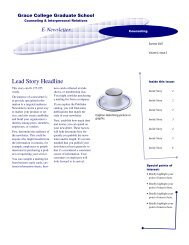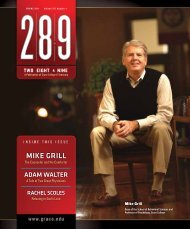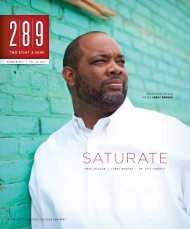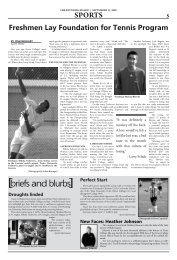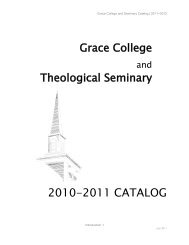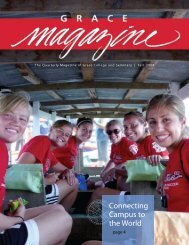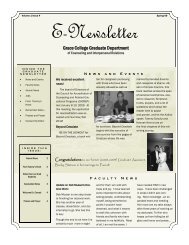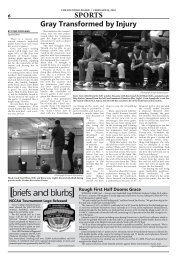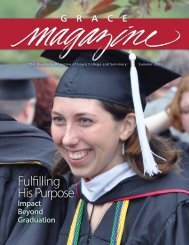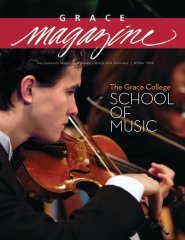Undergraduate Curriculum - Grace College and Seminary
Undergraduate Curriculum - Grace College and Seminary
Undergraduate Curriculum - Grace College and Seminary
Create successful ePaper yourself
Turn your PDF publications into a flip-book with our unique Google optimized e-Paper software.
<strong>Undergraduate</strong> <strong>Curriculum</strong> 3<br />
<strong>Grace</strong> <strong>College</strong> <strong>and</strong> <strong>Seminary</strong> Catalog | 2011–2012<br />
challenge each other as faculty members while caring for <strong>and</strong> serving our<br />
students. In an atmosphere permeated by the fruit of the spirit, our community<br />
will be a grace-filled place for us <strong>and</strong> our students to think critically, ask<br />
questions, <strong>and</strong> wrestle with the challenges of our world.<br />
God has called us to be a certain kind of people (BEING), for example, humane,<br />
communal, compassionate, redemptive, honest, just, hard working, etc. Further,<br />
God has called us to a life of learning <strong>and</strong> has invested us with the requisite skills<br />
<strong>and</strong> resources to learn (KNOWING), such as the mind <strong>and</strong> its cognitive<br />
capacities, the Scriptures, academic institutions, life experiences, peoples <strong>and</strong><br />
nations, etc. Finally, God has asked us to convert our being <strong>and</strong> knowing into<br />
service to others (DOING) as a way of expressing our love for <strong>and</strong> service to him.<br />
Therefore, <strong>Grace</strong> <strong>College</strong> <strong>and</strong> <strong>Grace</strong> Theological <strong>Seminary</strong> <strong>and</strong> their faculties<br />
are committed to integrated learning as a necessary component for<br />
empowering people to create lives that are whole, full, balanced, <strong>and</strong><br />
rewarding. 7<br />
There are a myriad of specific ways to accomplish the integration of faith <strong>and</strong><br />
learning in our study <strong>and</strong> in our teaching. They will vary depending on the<br />
context <strong>and</strong> discipline, but will always move beyond mere indoctrination. 8 At<br />
times, they may be of a reflective nature, having more to do with the questions<br />
that we ask <strong>and</strong> less about our conclusions. We might ask ourselves <strong>and</strong> our<br />
students, “How is the underst<strong>and</strong>ing that God created <strong>and</strong> sustains the world<br />
relevant to the material in question?” or “How does my belief in the fallen nature<br />
of human beings affect my world view?” or “How does the belief that all of<br />
humanity is loved <strong>and</strong> valued by God influence the way I consider those of<br />
other cultures?” 9 Other times, the integration of faith <strong>and</strong> learning will be of a<br />
more applied nature. 10 This will happen in many ways, not only in the classroom,<br />
but also as we mentor <strong>and</strong> advise students. We may prod ourselves <strong>and</strong> our<br />
7 From, Forbes, et. al., “Philosophy of Liberal Education,” Appendix C.<br />
8 According to Arthur Holmes (Idea of a Christian <strong>College</strong>, 46) “prepackaged answers” will never satisfy<br />
inquiring minds. “Students need rather to gain a realistic look at life <strong>and</strong> to discover for themselves the<br />
questions that confront us. They need to work their way painfully through the maze of alternative ideas <strong>and</strong><br />
arguments while finding out how the Christian faith speaks to such matters. They need a teacher as a<br />
catalyst <strong>and</strong> guide, one who has struggled <strong>and</strong> is struggling with similar questions <strong>and</strong> knows some of the<br />
pertinent materials <strong>and</strong> procedures. They need to be exposed to the frontiers of learning where problems<br />
are still not fully formulated <strong>and</strong> knowledge is exploding, <strong>and</strong> where by the very nature of things<br />
indoctrination is impossible.”<br />
9 On the significance <strong>and</strong> usefulness of theological questions within the context of Christian higher<br />
education, see Denise Lardner Carmody, Organizing a Christian Mind (Valley Forge, PA, Trinity Press<br />
International, 1996).<br />
10 George Marsden observes that faith can <strong>and</strong> should be integrated within even the most applied<br />
disciplines. He writes, “Even mathematicians or technical scientists will be able to point out some faithrelated<br />
considerations that have relevance to the foundational questions affecting the frameworks of their<br />
disciplines or the application of their work. It simply does not follow that, because there is no special<br />
Christian view of photosynthesis, there is therefore not a Christian view of biology.”<br />
July 2011



